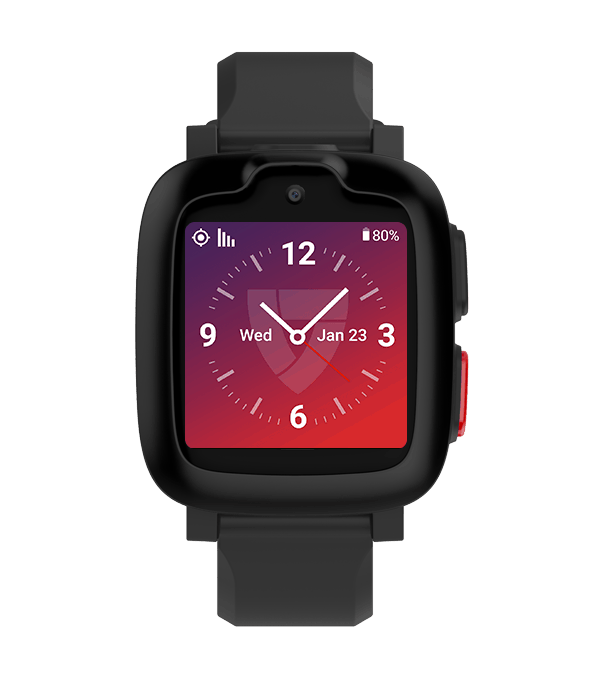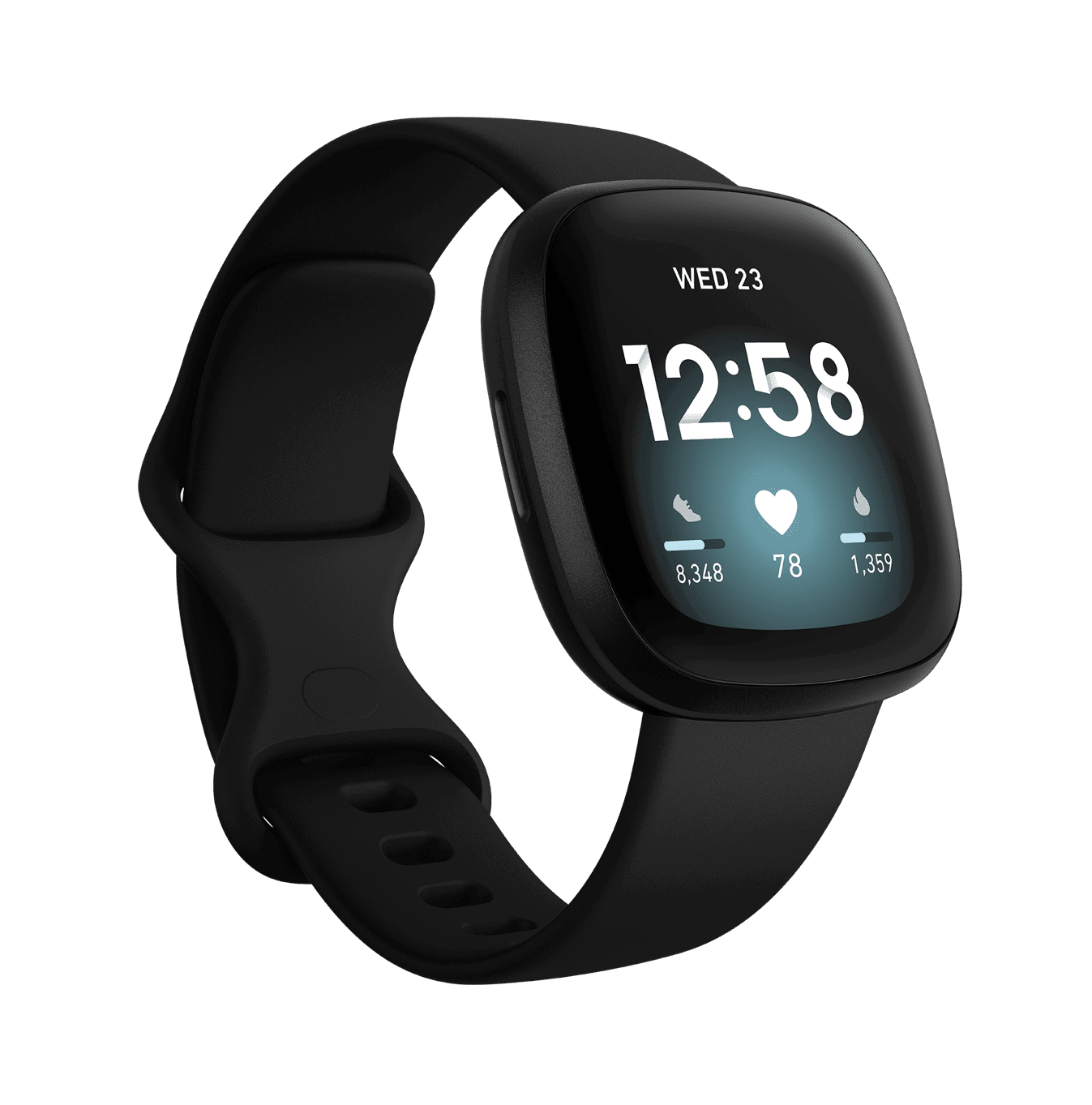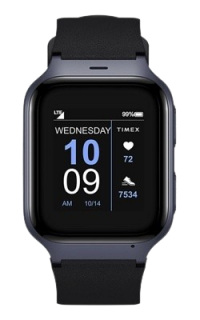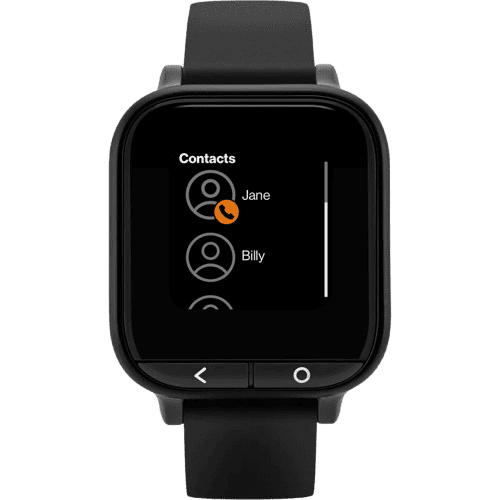The 3 Best Smartwatches for GPS Tracking for Seniors in 2026
A fall or other medical emergency can cause distress and panic, both for the person experiencing the health event and for loved ones who aren’t nearby to assist. When older adults wear GPS smartwatches, however, they can connect to help in seconds. Many of the devices alert emergency services when needed and contact designated caregivers at the same time, helping seniors remain independent without risking their safety.
After rigorously testing a dozen GPS smartwatches in varied environments, our team of caregivers and health-care professionals identified three standout options for 2026. The Medical Guardian MGMove lead in our tests with unmatched GPS accuracy and lightning-fast 10-second emergency responses, while Bay Alarm Medical’s SOS Smartwatch delivered excellent value with reliable tracking. We also found that for tech-savvy seniors, the Apple Watch SE 3 provides comprehensive health monitoring alongside robust location features.
Key Findings
- Medical Guardian’s MGMove provides industry-leading GPS accuracy and the fastest emergency-response times at just 10 seconds, making it our top recommendation for older adults who value reliable location tracking.
- Bay Alarm Medical’s SOS Smartwatch offers excellent value at $49.95 a month. Its consistent GPS performance and optional fall detection make it ideal for older adults who want affordable safety features.
- The Apple Watch SE 3 provides the most comprehensive health monitoring features and robust GPS capabilities at a competitive price of $249, but it doesn’t come with professional monitoring services.
Why Trust Us?
At TheSeniorList.com, our team of caregivers, experts, and healthcare professionals conducted over 5,000 hours of in-depth research and tests to recommend the most reliable devices for seniors. During the process, our team:
- Tested over 50 wearable devices from 15 different brands
- Surveyed 1,250 seniors and caregivers about medical alert system usage
- Consulted with geriatric care managers, nurses, and caregivers who specialize in senior safety
- Published dozens of videos demonstrating our smartwatch testing procedures
- Evaluated verified customer reviews of GPS smartwatches
Our Methodology
To create this list, we tested eight GPS-enabled smartwatches designed for or that are popular among older adults. As we evaluated each one, here’s what we looked for.
- GPS accuracy: We assessed each watch’s ability to pinpoint locations precisely in various environments, including urban settings, parks, and residential areas.
- Emergency response: We examined how quickly and effectively monitoring centers could locate the wearer during test calls.
- Ease of use: A GPS smartwatch must have intuitive controls that older adults of all technical skill levels can navigate easily.
- Caregiver features: We evaluated how effectively caregivers could track and communicate with seniors through companion apps and web portals.
- Battery life: We tested real-world battery performance to ensure that devices could maintain GPS functionality throughout daily activities.
- Durability: Devices were tested for water resistance and durability to make sure they continue functioning in various conditions.
- Value: We considered both up-front and subscription costs to determine overall value.
FYI: Research shows older adults appreciate GPS wearables and find they help them maintain their independence.1
>> Further Reading: The 5 Best Medical Alert Systems
Our Favorite GPS Smartwatches for Seniors
- Medical Guardian MGMove Watch : Best overall
- Bay Alarm SOS Smartwatch : Best value
- Apple Watch SE : Best additional features
GPS Smartwatches Compared
| Smartwatch | Rating | Device cost | Monthly cost | Battery life | GPS accuracy | Fall detection | Emergency response |
|---|---|---|---|---|---|---|---|
| MGMove | 4.6 | $199.95 | $42.95 | 20 hours | Excellent | Not available | 10-second response time |
| SOS Smartwatch | 4.5 | $199 | $49.95 | 14 hours | Very good | $10 per month | 16-second response time |
| Apple Watch SE 3 | 4 | Starting at $249 | Requires a cellular plan* | 18 hours | Excellent | Included | 911 calls only |
*Users can either purchase a cellular plan to use with their Apple Watch SE 3 or add the service to an iPhone’s wireless plan at no extra cost.
The Best GPS Smartwatches for Seniors of 2026
1. Medical Guardian MGMove Watch - Best Overall

800-520-5889
What We Like Most:
- Weather forecast
- Text-to-speech messaging
- Companion phone app
- Emergency assistance button
Overview
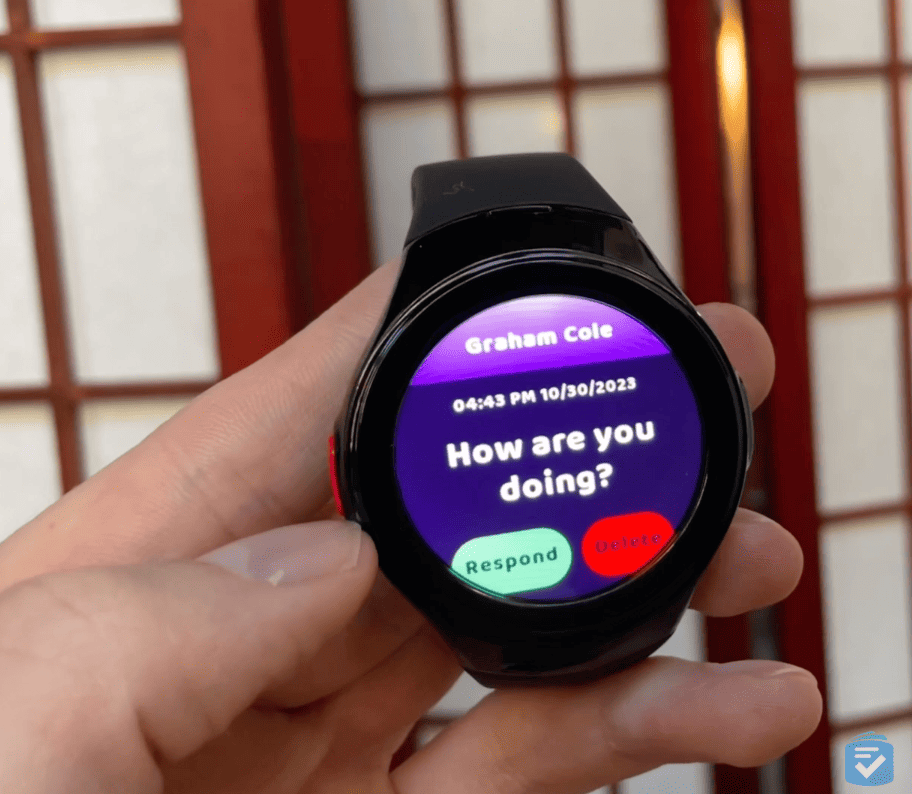
Cost: $199.95 equipment charge; $42.95 per month for monitoring
Battery life: 20 hours
Average emergency response time: 10 seconds
The MGMove from Medical Guardian earns our top recommendation for older adults seeking reliable GPS tracking. The smartwatch combines precise location monitoring with industry-leading emergency-response times, providing independence for seniors and peace of mind for caregivers.
GPS Performance
The MGMove consistently delivered exceptional GPS accuracy across various environments. We meticulously tested the device, placing test calls from different locations, such as parks, shopping centers, and residential neighborhoods. Medical Guardian’s response agents could pinpoint our exact location within seconds, often identifying specific landmarks and street addresses with remarkable precision.
The MyMedicalGuardian companion app makes the MGMove’s GPS even more useful, because it allows caregivers to accurately track the wearer’s location. Just note that like most medical alert smartwatches, the location data is updated only once every hour to save battery life.
Nevertheless, the location displayed in the app matched our location history, typically with only a 20-foot margin of error. That level of precision is crucial for caregivers who need to locate seniors quickly in emergency situations or find older adults who may wander.
Emergency Response
The MGMove has the fastest average response time of any medical alert watch we tested —10 seconds. That rapid connection to monitoring agents is critical in emergency situations when every second counts.
The dedicated emergency button on the side of the watch is easy to press but designed to prevent accidental activation. That means if the button isn’t pressed for a full five seconds, the emergency call is canceled — a thoughtful feature that prevents false alarms.
FYI: We found the button resistance to be just right: It’s not hard to push and hold even for users who may suffer from arthritis.
Caregiver Features
What distinguishes the MGMove from competitors is its comprehensive caregiver connectivity. Through the MyMedicalGuardian portal, family members can:
- Track the wearer’s location in real time
- Send text messages directly to the watch
- Set medication reminders and exercise prompts
- Receive notifications when emergency calls are placed
Those features, which cost an extra $5 per month, help increase safety and allow caregivers to stay connected without being intrusive.
Extra Features
In addition to GPS tracking, the MGMove includes weather forecasts, step counting, and an easy-to-read time display. The watch also offers surprisingly good battery life: In our tests, batteries lasted approximately 20 hours, which is long enough to get through a full day of activities without recharging.
The watch’s IP67 water-resistance rating means it can be worn in the shower. That’s a crucial safety feature, since the bathroom is a common place for falls. Roughly 14 million older adults fall each year,2 according to the Centers for Disease Control and Prevention, making accessible help extremely important.
Drawbacks
The MGMove smartwatch’s most significant limitation is that some of its most useful features are add-ons that cost extra each month. Fall detection, for example, costs $10 per month, and messaging and reminders features are bundled together for a $5 monthly fee.
Costs
The MGMove device costs $199.95, and monitoring service fees are $42.95 per month. Optional features cost extra.
It’s not the most affordable option, but the MGMove’s reliable GPS tracking, rapid emergency response, and caregiver features may justify the costs for many older adults and their families.
Learn more about Medical Guardian costs.
Our Verdict
MGMove’s exceptional GPS accuracy, industry-leading response times, and comprehensive caregiver features make it our top recommendation for older adults seeking reliable location tracking and emergency-response capabilities in one device.
To learn more about the device, read our full MGMove review.
Pros
- Fastest emergency response times (10 seconds on average)
- Exceptional GPS accuracy for precise location tracking
- Comprehensive caregiver tracking through the MyMedicalGuardian app
- 20-hour battery life
- Discreet, modern design
- Water-resistant for shower use
Cons
- Fall detection costs extra
- Additional fees for caregiver features
- Higher monthly cost than some competitors
2. Bay Alarm SOS Smartwatch - Best Value

844-284-7976
What We Like Most:
- Simplified interface
- No smartphone necessary
- SOS button with two-way communication
Overview
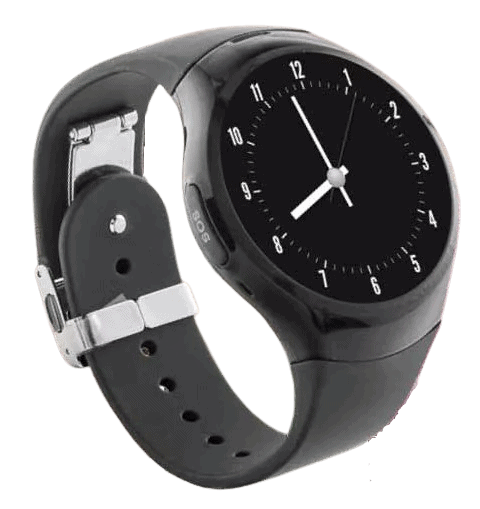
Cost: $199 equipment charge; $39.95 – $49.95 per month for monitoring
Battery life: 14 hours
Average emergency response time: 16 seconds
The SOS Smartwatch from Bay Alarm Medical earns our recommendation for older adults seeking reliable GPS tracking at a more affordable price. With consistent location accuracy and the option to add fall detection, the smartwatch offers excellent value while providing essential safety features.
GPS Performance
During our tests, the SOS Smartwatch’s GPS function provided accurate location tracking in various environments. When we placed test calls from outdoor locations such as parks and shopping centers, Bay Alarm Medical’s monitoring agents consistently and precisely identified our locations, down to the correct street address or nearby landmarks.
Although it doesn’t provide the pinpoint accuracy of the MGMove, the SOS Smartwatch’s GPS functionality proved more than adequate for emergency response purposes. The watch maintained reliable cellular connectivity even in more remote locations, ensuring that location data could be transmitted effectively to monitoring agents.
Emergency Response
In our tests, the SOS Smartwatch connected us to monitoring agents in an average of 16 seconds. That’s slightly slower than the MGMove, but it nevertheless exceeds industry standards and provides prompt assistance in emergency situations.
The emergency button is large and easy to press, requiring a two-second hold to activate — a good balance between ease of use and preventing false alarms. The clear two-way communication allowed for easy conversation with monitoring agents, even in noisier outdoor settings.
Fall Detection
The SOS Smartwatch truly stands out in its optional fall-detection capability, which costs an additional $10 a month. In our 20 simulated-fall tests, the watch accurately detected 15 falls (a 75 percent accuracy rate), which is a solid performance for this critical safety feature.
Remaining in a fallen position for too long can cause health complications. Automatic fall-detection systems can significantly reduce seniors’ time on the floor after a fall, lowering health risks, according to a study published in the Journal of Geriatric Physical Therapy.3
Extra Features
The SOS Smartwatch includes basic additional features such as step counting and weather forecasting. The watch’s interface is straightforward and easy to navigate, making it accessible for older adults with limited tech experience.
Its IP67 water-resistance rating means it can be worn in the shower, which increases safety during a common fall-risk activity. The watch’s comfortable band makes it suitable for all-day wear. Some medical alert bracelets, such as ADT’s, are made of plastic, which can be less comfortable than a band made of more flexible material such as rubber.
Drawbacks
The most significant limitation of the SOS Smartwatch is its relatively short battery life of 14 hours, which may not be sufficient for older adults who are very active throughout the day. Users need to be diligent about charging the device overnight.
Costs
The SOS Smartwatch device is currently available for $199, and monthly monitoring costs $39.95 per month. Adding optional fall detection increases monthly fees to $49.95.
Despite some limitations compared with competitors, the SOS Smartwatch offers excellent value for older adults primarily concerned with emergency response and basic GPS tracking capabilities.
Learn more about Bay Alarm Medical costs.
Our Verdict
For older adults who want reliable GPS tracking and an emergency-response system at an affordable price, the SOS Smartwatch delivers consistent performance and optional fall detection, which can be a lifesaving safety feature. It lacks some of the advanced features of its competitors, but its core function is what matters most: keeping older adults safe even if they’re on a budget.
To learn more about the device, read our full SOS Smartwatch Review.
Pros
- Reliable, accurate GPS tracking
- Optional fall detection
- More affordable monthly monitoring
- Easy-to-use interface
- Water-resistant for shower use
- Comfortable for all-day wear
Cons
- Limited 14-hour battery life
- Slightly slower emergency-response times than the MGMove
3. Apple Watch SE - Best Additional Features

What We Like Most:
- Highest number of band materials, colors, and designs
- Heart rate and sleep monitoring
- Data from T-Mobile, Verizon, or AT&T
- Fall detection and emergency SOS

Overview
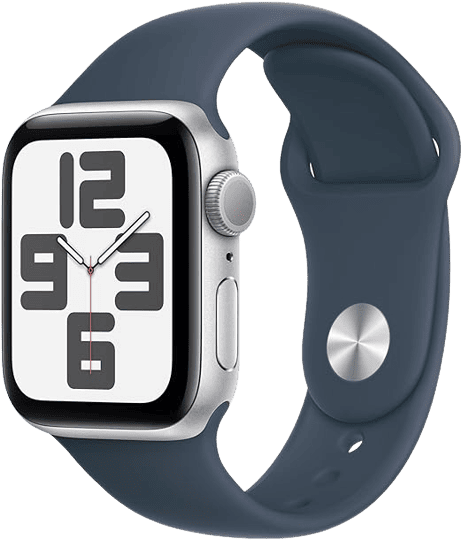
Cost: $249 (one-time purchase)
Battery life: 18 hours
Monitoring: Calls 911 directly
We found that the Apple Watch SE 3 offers the most robust set of features with excellent GPS capabilities. It is especially helpful for tech-savvy older adults looking for comprehensive tracking in a mainstream device.
The main downside is that Apple doesn’t offer a professional monitoring option for the Apple Watch SE 3 like the MGMove and SOS Smartwatch do. Because there’s no professional monitoring, the Apple Watch SE 3 doesn’t require users to sign a contract and pay ongoing monthly fees. It also excels in location accuracy, health metrics, and overall functionality.
Helpful Resource: Learn more about how the Apple Watch compares to other medical alert systems.
GPS Performance
The Apple Watch SE 3 features highly accurate GPS tracking capabilities that rival dedicated medical alert devices, such as the MGMove. During our tests, its location tracking proved extremely precise, typically within 10 feet of our actual position.
The watch uses a combination of GPS and other systems to ensure reliable location data even in challenging environments. The multisystem approach provides better accuracy than most dedicated medical alert watches, which makes it excellent for emergency situations and everyday location tracking.
Tip: Apple doesn’t have a dedicated app for caregivers, like the MGMove does. But Apple’s iPhone Find My app, which tracks the wearer’s location, is a great workaround.
Emergency Features
The Apple Watch SE 3 doesn’t connect to a professional monitoring center, unlike our other top picks. Instead, it calls 911 in emergency situations and sends your location to emergency services. When a fall is detected, the watch sends an alert to the wearer. If there’s no response within 60 seconds, it automatically calls emergency services and notifies designated emergency contacts. That means getting help to wearers in an emergency may take a little longer than with medical alert smartwatches from the top medical alert brands.
The watch also features a dedicated Emergency SOS function that can be activated by pressing and holding the side button, providing quick access to help when needed. During calls to emergency services, the watch automatically shares your current location and can continue updating your location as you move.
FYI: The Apple Watch isn’t linked to a monitoring service; activating the Emergency SOS connects you to 911. Although 911 typically picks up calls faster than medical alert monitoring services, 911 handles all types of emergencies, not just medical. Dedicated medical emergency monitoring centers therefore may be more efficient in their emergency responses than 911.
Additional Tracking Features
The Apple Watch SE 3 truly shines with comprehensive features beyond basic GPS tracking:
- Real-time location sharing with family members through the Find My app
- Detailed fitness tracking with routes mapped for outdoor activities
- Compass and altimeter for improved location awareness
- Find People app for two-way location sharing with friends and family
- Breadcrumb feature that tracks your path on walks or hikes
Those features make the Apple Watch SE 3 particularly valuable for active seniors who engage in outdoor activities and want detailed location tracking for both safety and fitness purposes.
Health Monitoring
The Apple Watch SE 3 includes other important health-monitoring features in addition to location tracking.
- Heart-rate monitoring with irregular-rhythm notifications
- Fall detection with automatic emergency calls
- Noise-level monitoring to protect hearing health
- Sleep-tracking capabilities
- Emergency Medical ID for first responders
Extra Features
The Apple Watch SE 3 offers numerous additional features valuable to older adults.
- Weather forecasts for planning outdoor activities
- Calendar reminders for appointments
- Medication tracking with the Health app
- Voice commands via Siri for hands-free operation
- Text messaging and phone calls
The watch also supports a vast ecosystem of third-party health, safety, and location apps that can extend its functionality.
Drawbacks
The primary limitation of the Apple Watch SE 3 for older adults is its lack of professional monitoring services. In emergency situations, the watch can only contact 911, which may not be ideal for seniors in non-life-threatening situations.
Additionally, the Apple Watch requires either pairing with an iPhone or paying for an additional cellular plan, which adds to the overall cost for seniors who don’t already use Apple products. The watch also has a steeper learning curve than dedicated medical alert watches, although tech-savvy older adults generally adapt quickly.
Costs
The Apple Watch SE 3 costs $249 up front, and there are no monthly fees for basic emergency functionality. To use cellular features independent of a smartphone, however, you’ll need to pay approximately $10 to $20 a month for a cellular plan.
FYI: Need a new cell plan? Take a look at affordable senior plans from T-Mobile.
For older adults who already use iPhones and are comfortable with technology, the Apple Watch SE 3 represents excellent value for a device that combines comprehensive GPS tracking with extensive health and safety features
Our Verdict
The Apple Watch SE 3 offers the most comprehensive package for active, tech-savvy seniors who prefer a device with a sleek design and customizable features in addition to reliable GPS tracking. It offers exceptional accuracy, combined with fall detection, automatic emergency calling, and extensive health monitoring. That makes it an excellent choice for those who don’t need professional monitoring services.
Pros
- Highly accurate GPS and location tracking
- Comprehensive health monitoring features
- Automatic fall detection
- Extensive ecosystem of apps
- Modern, stylish design
- Water-resistant for swimming
Cons
- No professional monitoring service
- Requires an iPhone or cellular plan for full functionality
- Steeper learning curve than dedicated medical alert watches
- Higher initial investment for Apple ecosystem
What Is a GPS Smartwatch for Seniors?
A GPS smartwatch for seniors combines location-tracking capabilities with safety features for older adults. Unlike standard GPS watches, these specialized smartwatches typically include more prominent displays, simplified interfaces, emergency-response functionality, and reliable location monitoring.
The best GPS smartwatches for seniors track location accurately while providing emergency assistance through fall detection, location history, geofencing capabilities, and connection to monitoring services or emergency contacts.
According to the Alzheimer’s Association, more than 6 million Americans are living with Alzheimer’s disease,4 and that number is expected to grow significantly as the population ages. GPS tracking devices can help caregivers locate seniors with cognitive impairments who may wander, potentially preventing dangerous situations.
GPS Smartwatches vs. Standard Medical Alert Systems
There’s significant overlap between GPS smartwatches and traditional medical alert systems for seniors, but there are some key differences.
- Discreet design: GPS smartwatches look like regular watches, offering a more discreet option than pendant-style medical alert systems, which can feel stigmatizing.
- Precision tracking: GPS smartwatches typically offer more precise location tracking than basic mobile medical alert systems, with accuracy often within 10 feet to 20 feet.
- Multiple functions: GPS smartwatches generally include additional features such as time display, weather, and activity tracking, which makes them more versatile than single-purpose medical alert devices.
- Battery considerations: Traditional medical alert devices often have longer battery life (sometimes two to three days) than smartwatches, which typically need charging daily.
- User interface: Smartwatches have touch screens and more complex interfaces, which can be beneficial for tech-savvy seniors but challenging for those with limited tech experience.
For many active seniors, GPS smartwatches strike an ideal balance between safety and independence, allowing them to maintain active lifestyles while ensuring help is available if they need it.
How to Choose the Right GPS Smartwatch for Seniors
When selecting a GPS smartwatch for yourself or an older loved one, consider these important factors:
- GPS accuracy: Look for devices with proven location accuracy, particularly in indoor environments, urban areas, and more remote locations.
- Technical comfort level: Consider the wearer’s familiarity with technology. Some devices offer simplified interfaces designed for older adults with limited tech experience.
- Monitoring needs: Based on the older adult’s health status and living situation, determine whether professional monitoring is necessary or if automatic emergency calling is sufficient.
- Caregiver involvement: If family members are able to actively monitor a loved one’s location, look for devices with companion apps that allow for real-time tracking.
- Battery longevity: Consider daily routines and how frequently the user will charge the device. Most GPS smartwatches require daily charging.
- Water resistance: Choose water-resistant devices that can be worn in the shower, because bathrooms are common locations for falls.
Honorable Mentions
Samsung Galaxy Watch4
It wasn’t designed to be a medical alert device, but the Samsung Galaxy Watch4 offers excellent GPS tracking features for active older adults. With Google Maps integration, robust health monitoring tools, and good battery life, it’s ideal for tech-savvy older adults who don’t need emergency monitoring services.
The Watch4 can detect falls and includes safety features such as emergency contact alerts, but it does not offer professional monitoring services like our top picks do. At approximately $199, it represents a good value for seniors who already use Android smartphones and are primarily interested in comprehensive location tracking in a stylish package.
UnaliWear Kanega Watch
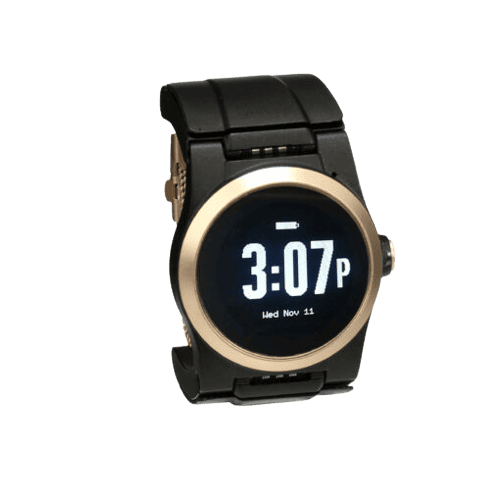
The Kanega Watch from UnaliWear deserves a mention for its unique voice-activated GPS features and impressive 32-hour battery life. Most GPS watches rely on touch screens, but the Kanega Watch allows users to ask for their location or directions home using voice commands. That makes the watch more accessible for seniors with dexterity challenges. Note, however, that location information is shared only with monitoring agents, not caregivers.
The Kanega Watch’s location tracking proved reliable in our tests, but did not quite match the precision of our top picks. And at $299 for the watch and $84.95 monthly for monitoring, it’s significantly more expensive than our top recommendations.
Bottom Line
GPS smartwatches offer active seniors a powerful combination of location tracking and safety features in discreet, wearable devices. Our top recommendations cater to different priorities.
- The Medical Guardian MGMove provides the best overall GPS accuracy, industry-leading response times, and comprehensive caregiver tracking features.
- The Bay Alarm Medical SOS Smartwatch offers reliable GPS capabilities at a competitive price, which is ideal for budget-conscious older adults who still want quality location tracking.
- The Apple Watch SE 3 delivers the most comprehensive feature set and excellent GPS accuracy in a mainstream device without professional monitoring services.
When choosing a GPS smartwatch for yourself or a loved one, consider individual needs, comfort level with technology, and budget to find the best device to increase safety while supporting an active, independent lifestyle.
Frequently Asked Questions
-
How accurate is GPS tracking on smartwatches?
GPS accuracy varies by device and environment. In our testing, the MGMove and Apple Watch SE 3 consistently provided location data within 10 feet to 20 feet of our actual position in most environments. The SOS Smartwatch typically achieved accuracy within 30 feet to 50 feet. Our testers noticed that all three performed better outdoors with clear sky visibility than they did in indoor settings or dense urban environments with tall buildings.
-
Do GPS smartwatches work everywhere?
The devices transmit location data using cellular networks. The MGMove and the SOS Smartwatch use AT&T’s 4G network, while the Apple Watch SE 3 can use various carriers, depending on your cellular plan. Coverage may be limited in rural areas, so it’s important to check carrier coverage maps for your specific location before purchasing.
-
Can family members track the watches in real time?
It depends on the device. The MGMove, SOS Smartwatch, and Apple Watch SE 3 allow family members to track a user’s live location. Some medical alert watches, however, provide that information only to monitoring agents.
-
How long do the batteries last on GPS smartwatches for seniors?
Using GPS features significantly affects a device’s battery life. The MGMove lasts approximately 20 hours with regular use, the SOS Smartwatch about 14 hours, and the Apple Watch SE 3 around 18 hours. Continuous GPS tracking (such as during outdoor activities) will drain the battery more quickly on all devices. It’s helpful for users to charge their devices overnight.
-
Can GPS smartwatches detect wandering?
The SOS Smartwatch does not currently offer geofencing capabilities like the Apple Watch SE 3 does. Geofencing capabilities can alert caregivers when the wearer leaves a designated safe area. The feature is particularly valuable for older adults with cognitive impairments who may wander.


